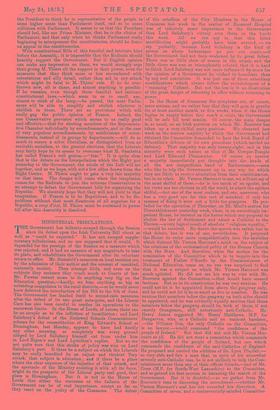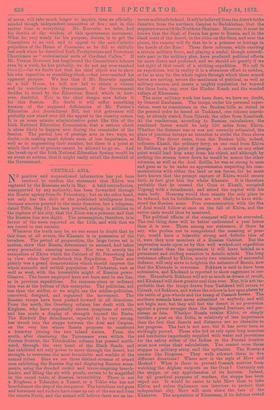MINISTERIAL TRIBULATIONS.
THE Government has hitherto scraped through the Session since its defeat upon the Irish University Bill about as well as "could be expected." It has not escaped supple- mentary tribulations, and no one supposed that it would. It depended for the prestige of the Session on a measure which was rejected, and it had no measure of any magnitude to take its place, and rehabilitate the Government after its reluctant return to office. Mr. Stansfeld's measures on local taxation are, by the admission of their author and the consent of mankind, eminently modest. They attempt little, and even on the subjects they embrace they remit much to Courts of law. Mr. Forster cannot mean to do anything very big on the Education question,—hardly, we fear, anything so big as extending compulsion to the rural districts,—or he would never have deferred the introduction of his Bill to the 9th of June. The Government has limited itself to second-rate measures after the defeat of its one great enterprise, and the Liberal Cave has also been careful to confine its operations to the narrowest limits. In the House of Lords, of course, there can be no scruple as to the infliction of humiliation ; and Lord Salisbury's defeat of the Endowed Schools Commissioners' scheme for the reconstitution of King Edward's School at Birmingham, last Monday, appears to have had hardly any other meaning, so completely was every ground alleged by Lord Salisbury himself cut from under him in Lord Ripon's and Lord Lyttelton's replies. But we are not quite sure that this stroke of policy was wise on Lord Salisbury's part. If there be a subject on which the Liberals may be really benefited by an unjust and virulent Tory
attack, that subject is education ; anel if there be a place where the clear exposure of the injustice of that attack, and the spectacle of the Ministry resisting it with all its force, might do the prospects of the Liberal party real good, that place is Birmingham. But it is not in the House of Lords that either the successes or the failures of the Government can be of real importance, except so far as they react on the policy of the Commons. The defeat of the rebellion of the City Members in the House of Commons last week in the matter of Emanuel Hospital was of infinitely more importance to the Government than Lord Salisbury's victory over them in the Lords this week. All we can say is, that this latter
mortification might probably have been averted, — we say probably,' because Lord Salisbury is the kind of person on whose forbearance no one can count,—if the Government had not been weakened by its great defeat. There was so little show of reason in the attack, and the little there was was so triumphantly refuted, that it is hard to think Lord Salisbury was not more influenced by scorn for the opinion of a Government he wished to humiliate, than by any real conviction. It was just one of those subsidiary mortifications which always follow the re-instatement of a " resuming " Cabinet. But not the less is it an illustration of the great danger of returning to office without returning to power.
In the House of Commons the symptoms are, of course, more serious, and we rather fear that they will gain in gravity for at least another month or five weeks, when, if the House begins to empty before they reach a crisis, the Government will be safe till next session. Of course, the main danger is, as usual, on an Irish question on which Mr. Bouverie has taken up a very skilful party position. We observed last week on the narrow majority by which the Government had obtained the Committee demanded to hear the Irish Board of Education's defence of its own procedure (which needed no defence). That majority was only twenty-eight, and in the minority were such names as that of Mr. Cowper-Temple and Lord Edmund Fitzmaurice. Of course so narrow a majority immediately put thoughts into the heads of all the not insignificant band of Embarrassers,—men who like to trip the Government up in any way for which they are likely to receive absolution from their constituencies, but in no other. Mr. Vernon Harcourt is one, we will not say of the most skilful of these,—he is too much of an egotist, and his views are too obvious to all the world, to admit the epithet skilful,—but one of the most zealous, and one, moreover, who has a very good eye for this sort of mischief, if only his manner of doing it were not a little too pompous. He pre- luded for the operation of Thursday, on Mr. Miall's motion for Disestablishment yesterday week, when, in an exceedingly im- patient House, he insisted on the horror which any proposal to abolish the law of Settlement and admit a Catholic to the Throne,—a very logical result of absolute "religious equality," —would be received. No doubt the speech was rather lost in that debate, but it was of use, nevertheless. It prepared the House to enter more sympathetically into the anxieties which distract Mr. Vernon Harcourt's mind on the subject of the relations of the ecclesiastical polity of the Roman Church with the State. And therefore, when the motion for the nomination of the Committee which is to inquire into the treatment of Father O'Keeffe by the Commissioners of National Education, came on, no one was surprised to find that it was a subject on which Mr. Vernon Harcourt was much agitated. He did not see his way to vote with Mr. Bouverie against the Committee,—that would have seemed factious. But as to its constitution he was very anxious. He could not let it be appointed from above the gangway only, and he could not let it be so small as five in number. He was anxious that members below the gangway on both sides should be appointed, and he was evidently equally anxious that those members below the gangway should be, both of them, if not exactly Orangemen, still notoriously anti-Catholic. Mr. Henry James suggested Mr. Henry Matthews, M.P. for Dungarvan, who, as a Catholic and an eminent barrister, —the O'Conor Don, the only Catholic on the Committee, is no lawyer,—would command "the confidence of the people of Ireland." But that did not suit Mr. Vernon Har- court at all. He did not want a committee which commands the confidence of the people of Ireland, but one which commands the confidence of the anti-Catholics of England.
He proposed and carried the addition of Dr. Lyon Playfair,— so very able and fair a man that, in spite of his somewhat severely anti-Catholic bias, he is not unlikely to help the Com- missioners more than any of their official friends,—and of Mr. Cross (M.P. for South-West Lancashire) to the Committee, and so gained his first success in harassing the march of the Government. But it is doubtful,—as we gather from Mr. Bouverie's tone in discussing the amendment,—whether Mr. Vernon Harcourt's zeal has not exceeded his discretion. A Committee of seven, and a controversially-minded Committee of seven, will take much longer to inquire, than an officially- mense multitude behind. It willbebelieved from the Attrek to the minded though independent committee of five ; and in this Jaxartes, from the northern Caspian to Badakhshan, that the matter time is everything. Mr. Bouverie, we infer, had steppe swarms with the Northern Shaitans. Moreover, it must be his doubts of the wisdom of this spontaneous movement, known that the Shah of Persia has gone to Russia, and in the What he, very wisely for his purpose, desires, is to get the black tents of the desert, in the cities on the Oxus, and over the Committee to an end, and to appeal to the anti-Catholic plains, the rumour will fly that he is a prisoner or hostage in prejudices of the House of Commons, as he did so skilfully the hands of the Russ ! These three columns, while exerting last week when he described Irish Presbyterians and Protestant a certain military force, and playing a useful, though subordi- Churchmen as "ecclesiastical serfs of Cardinal Cullen." If nate part in the military plan, have produced political effects Mr. Vernon Harcourt has lengthened the Committee's labours far more direct and profound, and we should err greatly if we even by a week, he has probably, we do not say over-reached lost sight of that result of a striking expedition. We call it
• hintself,—for we doubt not that his chief object was to show an expedition, but in reality it is a strenuous effort to subdue, his own capacities as stumbling-block,—but over-reached his as far as may be, the whole region through which these armed apparent purpose. We fear that if Mr. Bouverie appeals forces are moving, secure the maximum of political, as well as to a full House, he will not fail to obtain a victory military success, and create a mighty reputation far beyond -and to overthrow the Government, if the Government the Oxus basin, nay, over the Hindoo Koosh and the wooded decides to stand by the Education Board, which is, how- valleys of Khorassan.
ever, doubtful. This is the chief danger now before it The main military work has been done, we have no doubt, for this Session. No doubt it will suffer something by General Kaufmann. The troops, under his personal super- because of the supposed deficiencies of Mr. Forster's vision, were to concentrate in the Boukan hills, as stated in Education Act Amendment Bill, but that grievance will the general order he issued at Tashkend, one column march- probably now stand over till the appeal to the country comes. ing, as already stated, from Djizzak, the other from Kasalinsk. It is on some minute administrative point like this of the At the rendezvous, according to Russian calculations, the Irish National Education Commission, that a serious check combined forces would be only 150 miles from Khiva. is alone likely to happen now during the remainder of the Whether the distance was or was not correctly estimated, the Session. The partial loss of prestige acts in two ways, no place of junction betrays an intention to strike the Oxus above doubt,—in making small defeats seem of less importance, as Khiva. The direct route, from the Bonkan hills, indeed, well as in augmenting their number, but there is a point at indicates Khanli, the ordinary ferry, on one road from Khiva which that sort of process cannot be allowed to go on. And to Bokhara, as the point of passage. A march on any other the break-up of the Irish National Education System would be point would lead him away from his object, and although by an event so serious, that it might easily entail the downfall of striking the stream lower down he would be nearer the other



































 Previous page
Previous page